
Lima, founded in 1535 as the Ciudad de los Reyes, is the capital and largest city of Peru. It is located in the valleys of the Chillón, Rímac and Lurín Rivers, in the desert zone of the central coastal part of the country, overlooking the Pacific Ocean. The city is considered the political, cultural, financial and commercial center of Peru. Due to its geostrategic importance, the Globalization and World Cities Research Network has categorized it as a "beta" tier city. Jurisdictionally, the metropolis extends mainly within the province of Lima and in a smaller portion, to the west, within the Constitutional Province of Callao, where the seaport and the Jorge Chávez Airport are located. Both provinces have regional autonomy since 2002.
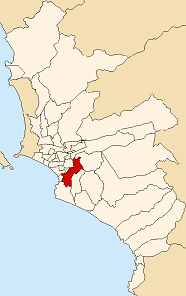
Santiago de Surco, commonly known simply as Surco, is a district of Lima, Peru. It is bordered on the north with the district of Ate Vitarte and La Molina; on the east with San Juan de Miraflores, on the west with San Borja, Surquillo, Miraflores and Barranco, and on the south with Chorrillos.

Barranco, founded in 1874 as San José de Surco, is one of 43 districts in Lima, Peru. Its current mayor is Jessica Vargas.
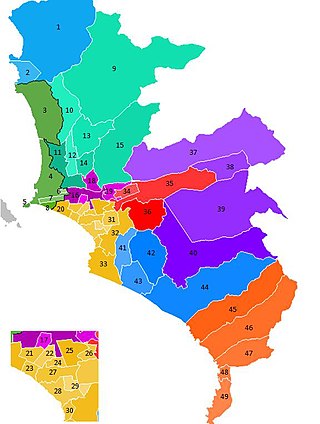
The Lima Metropolitan Area is an area formed by the conurbation of the Peruvian provinces of Lima and Callao. It is the largest of the metropolitan areas of Peru, the seventh largest in the Americas, the fourth largest in Latin America, and among the thirty largest in the world. The conurbation process started to be evident in the 1980s.

Julio Ramón Ribeyro Zúñiga was a Peruvian writer best known for his short stories. He was also successful in other genres: novel, essay, theater, diary and aphorism. In the year of his death, he was awarded the US$100,000 Premio Juan Rulfo de literatura latinoamericana y del Caribe. His work has been translated into numerous languages, including English.

The Historic Centre of Lima is the historic city centre of the city of Lima, the capital of Peru. Located in the city's districts of Lima and Rímac, both in the Rímac Valley, it consists of two areas: the first is the Monumental Zone established by the Peruvian government in 1972, and the second one—contained within the first one—is the World Heritage Site established by UNESCO in 1988, whose buildings are marked with the organisation's black-and-white shield.
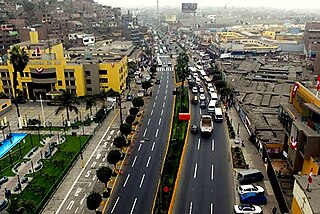
The Ate district, also called Ate-Vitarte, is one of the forty-three districts that make up the Lima Province, located in Peru.
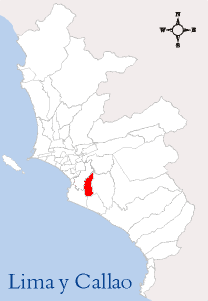
The district of San Juan de Miraflores is one of the forty-three districts that make up the province of Lima, located in the department of the same name, in Peru. Is one of the new towns, that have been formed by the massive numbers of people moving from other towns of Metropolitan Lima and from the countryside. During the early 1960s, was mostly a desert area.
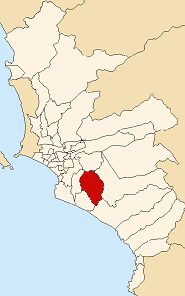
Mary of the Triumph Town District is a district of the Lima Province in Peru. It is located in the Cono Sur area of the city of Lima. It was officially established as a district on December 28, 1961. The current mayor (alcalde) of Villa María del Triunfo is Eloy Chávez Hernández.

San Cristóbal, is the fourth locality of Bogotá, capital of Colombia. It is located in the southeast of Bogota. This district is mostly inhabited by lower class residents.

The Plaza Mayor de Lima, or Plaza de Armas de Lima, is considered one of the birthplaces of the city of Lima, as well as the core of the city. Located in the Historic Centre of Lima, it is surrounded by the Government Palace, Lima Metropolitan Cathedral, Archbishop's Palace of Lima, the Municipal Palace, and the Palacio de la Unión.

José Juan de Dios Mateo Osbaldo Botaro Lepiani Toledo was a Peruvian painter. He is primarily known for historical and patriotic scenes; notably those related to the War of the Pacific.

Juan Antonio Ribeyro Estada was a 19th-century Peruvian politician. He was Prime Minister of Peru. He was President of the Supreme Court of Peru. He served in the Chamber of Deputies of Peru.

The Lima campaign is the third land campaign of the War of the Pacific, carried out by Chile between December 1880 and January 1881. The campaign ended with the Chilean occupation of the Peruvian capital and the establishment of the Chilean authority in it and other surrounding territories, which would extend until 1883, with the end of the war.

The Municipal Palace of Miraflores is the current headquarters of the municipal corporation of the Lima district of Miraflores in Peru. It is located at number 400 Larco Avenue, in front of Miraflores Central Park. It was declared a national monument in 1999.

The Quinta de Presa is a French-style country mansion built in the 18th century during the government of the then viceroy of Peru, Manuel de Amat y Junyent. It comprises a constructed area of 15,159 square metres (163,170 sq ft). It is located in the jirón Chira of the Rímac district, Lima, Peru.

Italy Square, formerly known as Saint Anne's Square, is a public square in the Barrios Altos neighbourhood of Lima, Peru. It was the second square built by the Spanish during the colonial era and later served as one of the four squares where the independence of Peru was declared in the city.

The Parque Reducto No. 2 is a 20,000 m2 public park located at the intersections of Benavides and Luis Bedoya Reyes avenues, in Miraflores District, Lima, Peru. Located in a former redoubt built by the Peruvian Army during the War of the Pacific, it was declared a National Monument in 1944, and a Patriotic Sanctuary in 1965.
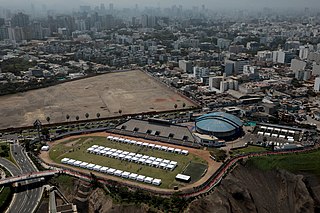
San Martín barracks, originally Junín barracks, was a military instalation inaugurated in 1921 to house the Mounted Grenadiers Regiment of the Argentine delegation that visited the country for the Centennial of the Independence of Peru. Located the 13th block of the Avenida del Ejército, it was subsequently closed and auctioned in 2009 and demolished a year later.



















